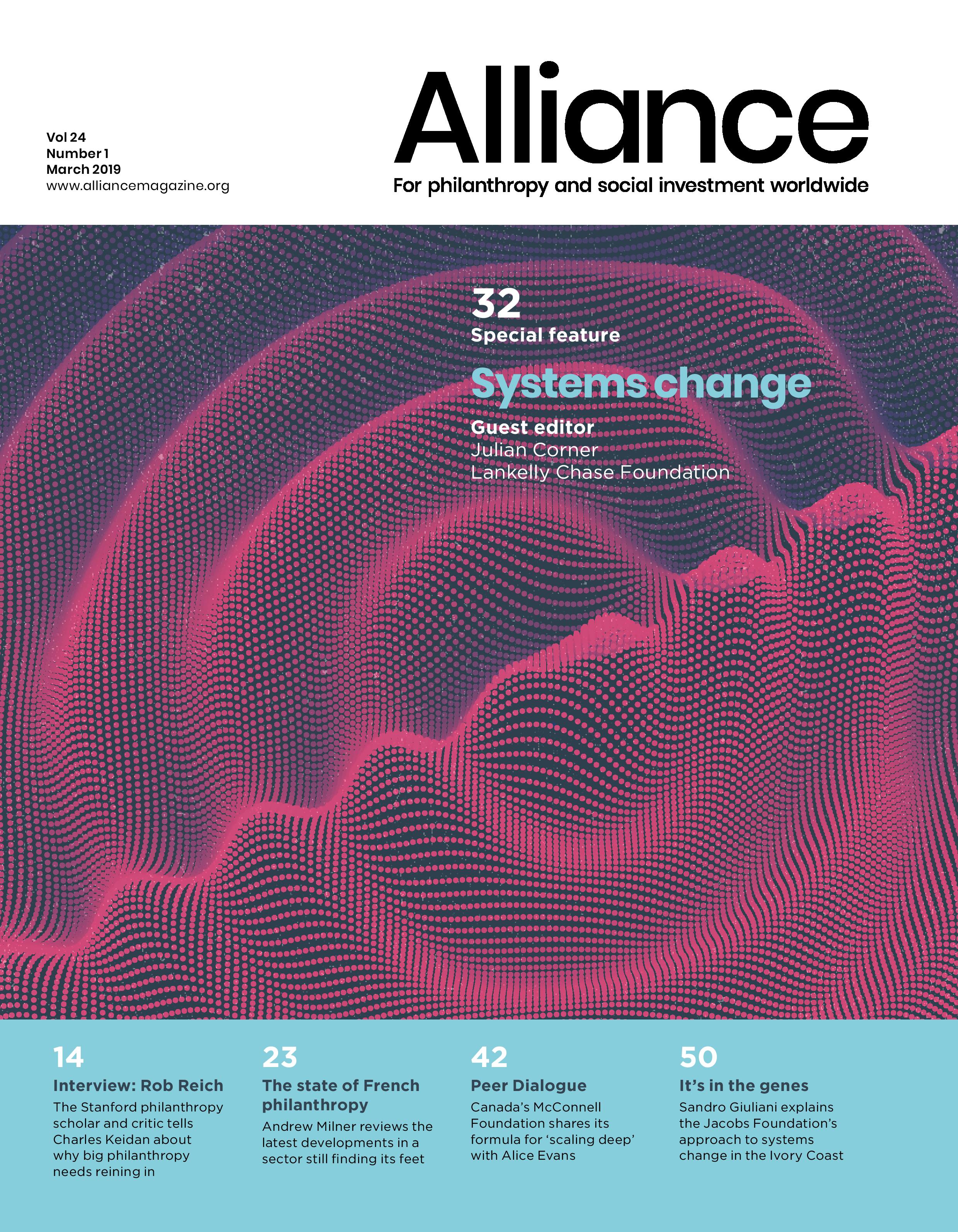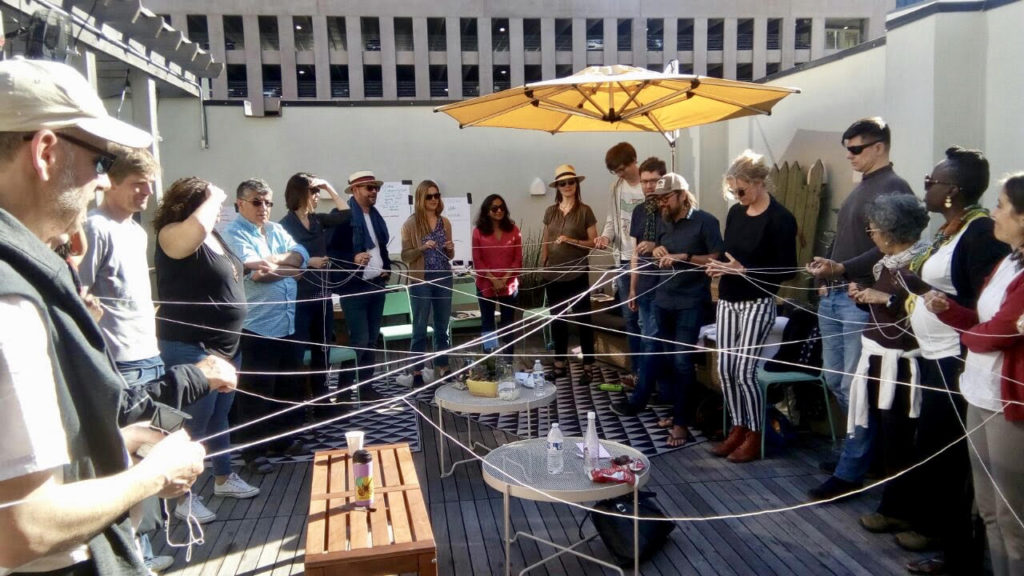Our society is structured to put the profit and privilege of a few before the well-being of the planet and its inhabitants
Philanthropy is constantly trying to reinvent and justify itself. ‘Systems change’ and ‘systemic change philanthropy’ are among the latest buzzwords. In 2016, Rockefeller Philanthropy Advisors launched their Scaling Solutions for Systems Change project; the ‘collaborative philanthropy’ Co-Impact Initiative is obsessed with systems change; Lankelly Chase Foundation has put systems change at its core and even organised a ‘systems retreat’ for funders. And this very issue of Alliance magazine has dedicated a whole issue to the topic. But what ‘system’ are they all referring to?
Indicators as diverse as global GDP growth, loss of biodiversity, CO2 concentration in the atmosphere, foreign direct investment, inequality or the number of undernourished people in the world all share the same feature: an exponential and annually increasing rise over the last 50 years. The wicked problems of our times are deeply interwoven with today’s global political economy. How can we tackle, say, homelessness, if we don’t look at migration (many homeless people are migrants), and climate change (as a migration push factor), and an overheated growth- and profit-obsessed global trade system based on extractive capitalism (which provokes climate change)?
This intertwined economic, social, political and environmental crisis has not come about by chance. It is the result of a political economy that favours the concentration of profits and privileges of a few over the well-being of the vast majority of the planet’s life forms. That is ‘the system’ that systemic change philanthropy has to change.
This intertwined economic, social, political and environmental crisis has not come about by chance. It is the result of a political economy that favours the concentration of profits and privileges of a few over the well-being of the vast majority of the planet’s life forms. That is ‘the system’ that systemic change philanthropy has to change.
How can we change the system?
To transform ourselves into agents of systemic change we need to understand what alternatives there are to an extractivist capitalist political economy.
Funder trainings and events focused on systemic change are blossoming to meet the increasing demand for funders who are ready to begin practising philanthropy in a different way.
They include Buen Vivir, feminist thinking, de-growth and heterodox economics, the Rights of Nature approach or The Commons – all open alternative ways to the management of goods, wealth and power – and there are many more.
All of these visions can provide answers flowing from the analysis above and translate it into new practices. Many organisations, including foundations, are already applying and experimenting with them. The European Climate Foundation for example, long-time proponent of a ‘green growth’ agenda, calls for ‘economic systems change’ and a ‘radical transition’. Similarly, a range of funders, from Chorus Foundation to Oak, embrace (to varying degrees) the concept of a just transition to a non-extractive economy.
Funder trainings and events focused on systemic change, such as EDGE’s Global Engagement Lab (a peer learning programme for funders from around the world) are blossoming to meet the increasing demand for funders who are ready to begin practising philanthropy in a different way.
Where do I start?
Systemic change philanthropy requires three tiers of transformation – of ourselves, our organisations and our field.
At EDGE and the Indie Philanthropy Initiative, we believe that meaningful change starts with self-analysis. We should begin by asking ourselves a number of fundamental, often uncomfortable, questions: where do we actually contribute to perpetuating the systemic crises we are in? Where do our investments go? Do we have organisational climate impact policies, or don’t we care how much climate gas emissions we emit through our charity jet-set lives? How do we deal with gender, sexuality, religion, diversity, power and privilege in our organisations? Whose voices get heard and whose are silenced? Who decides which grants to make, and why? And where does all this philanthropic money actually come from in the first place?
Systemic change philanthropy is a living thing. If we chart it out, canonise it, and offer it up to the philanthropic buzzword laboratory we risk losing its possibilities, its nimbleness, its strength.
Only when we’ve answered these questions can we look outward and offer spaces for other funders to begin similar inquiries.
So what is systemic change philanthropy?
Systemic change philanthropy is a living thing. If we chart it out, canonise it, and offer it up to the philanthropic buzzword laboratory we risk losing its possibilities, its nimbleness, its strength. But, we also know that we need guides, frameworks and ways to report to each other in order to unlock the billions of dollars needed to change the systems we’re talking about.
So, we leave you with an evolving list of characteristics, based on our own experiences and the examples we see from funders who are already beginning to practise in this way. We hope you’ll continue to refine this list with us, and with each other.
Systemic change philanthropy:
- acknowledges the interconnected, systemic character of the multiple crises facing us
- requires that funders see themselves as a part of the system, and thus part of the problem, as well as the solution
- incorporates and adds to social justice philanthropy by addressing root causes of injustice and systemic crises through a de-siloed, participatory and trust-based funding model
- makes grants that address underlying systems feeding the crises, such as extraction, racism, colonialism, patriarchy, plutocracy, neo-liberal capitalism, etc
- must address healing. To change the systems we have to recognise past injustices – for philanthropy that means funders, activists, movement leaders, grantees, etc. sitting at the same table, creating safe and brave spaces, and being willing to undergo the discomfort of transformation.
Systemic change philanthropy is uncomfortable. It’s cumbersome. It’s complex and also simple. Building it is a never-ending process. A utopia that, as Eduardo Galeano said, will always be at the horizon. With every step we take, it shifts a step further away. But it keeps us moving.
Arianne Shaffer is director of the Indie Philanthropy Initiative.
Email: arianne@indiephilanthropy.org
Twitter: @IndieFunder
Tobias Troll is European director of the EDGE Funders Alliance.
Email: tobias@edgefunders.org
Twitter: @EDGEFunders







Comments (0)